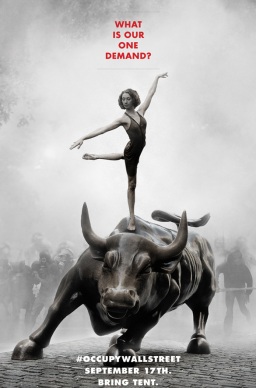Net Neutrality
Net neutrality is the idea that internet service providers must treat all content on the Internet the same, without discriminating or charging differently for different services. It has become a major issue these past few months in the United States with President Trump’s nomination of Ajit Pai to FCC chairman. Ajit Pai wants to repeal Title II regulations and there has been a comment period for people to send in their opinions to the FCC. Over 98% of comments have supported the principles of net neutrality. However, corporations such as AT&T and Comcast have successfully lobbied the FCC to repeal the regulations, and repeatedly claim that net neutrality will still be intact even after corporations lose any incentive to providing fair internet and even after documented cases of telecoms throttling their customers.
A lot of the rhetoric that comes from supporters net neutrality is similar to the rhetoric used for the Occupy Wall Street movement.
Occupy Wall Street

Occupy Wall Street was a movement that started in September of 2011 near New York City’s financial district. Protestors called for action against big corporations and their influence over the federal government. The main slogan was “We are the 99%”, referring to the economic inequality between the wealthiest 1% of the population and the rest of America. It was a large show of civil disobedience. Ultimately it was unsuccessful.
Similarities
There are many similarities between the rhetoric for Occupy Wall Street and Net Neutrality. They both share the dichotomy of the 99% of Americans vs. big corporations, and both condemn the influence of corporations on America’s policymaking. One might even say that the battle over net neutrality could eventually mirror the protests seen at Zuccotti Park. So far, net neutrality seems far more popular in the public eye, even though many consumers have never heard of the concept or don’t understand what it could mean.
For the most part both of the artifacts you chose seem to be contemporary. Like you mentioned, the issues with net neutrality are far more prominent in the public’s eye at the moment, but the protests for Occupy Wall Street were not too long in the past that they would be irrelevant. It is interesting that rather than focus on a similar topic, you chose to compare two different movements and tie together a crucial aspect of who is behind these two ideas and what that represents. I am not very knowledgeable on what either topics are, so I think it could be helpful to include a little background to provide a better understanding of who was affected, why it is important, and how it affected society. This post entails a decent background on some of those points, and I think the length of the paper will allow you to delve deeper into those ideas and build from there. Overall, both topics definitely share the element of kairos, and because of its applicability to not just Americans, but the majority of the population, I think creating an emotional tie to the topics will be simple.
Hey Andrew,
This is a great connection you made between Occupy Wall Street in 2011 and the Net Neutrality issue going on now. Your point that both of these issues was about the fight between corporations and the people perfectly tied them together. Great job.
I bet in your paper you could look into the details of how these two issues are very controversial and that there is no easy solution. There is probably tons of rhetoric using logos and ethos to try and persuade the American audience on this issue.